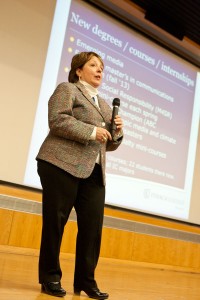Dean Diane Gayeski emphasized maintaining the Park School’s reputation for undergraduate education while pursuing a new master’s program during her State of the School address Tuesday afternoon in the Park Auditorium.

Gayeski used the hour-long forum to update the audience of faculty and some students on the expansion of the graduate program in communications innovation and changes within academic programs that, she said, will continue to distinguish the Roy H. Park School of Communications from its competitors.
“A lot of other places can compete with us, and they do compete with us very well,” Gayeski said. “But what is really hard to duplicate is what we’ve built over about 50 years, which is great engagement, primarily with alumni and with other people in the profession.”
The college will be extending its professional reach with the executive-style master’s degree in communications innovation, which is still, according to Gayeski, in the planning stages. Between 12 and 15 professionals from around the world will enroll in the two-year master’s program.
“The idea is that they will be mid-career, successful in their own area of communications,” she said. “But they are going to be the next movers and shakers and innovators.”
To complete the degree, students will complete all their required courses online, she said, and they will travel to different locations around the world for three-to-four day classes on special topics.
Gayeski said the school hopes to hire a program director this summer, who will start to recruit the first incoming class for Fall 2013. The program must still be approved, she said, because it is both the first executive-style master’s to be offered at Ithaca College, in addition to the first online degree.
Matt Mogekwu, associate professor of journalism, said the program will help garner the school more exposure on an international level.
“If everything goes well, I think Ithaca College’s Park School of Communications will be a model for even the bigger universities to see how communications programs can be managed in an institution of higher learning,” Mogekwu said.
Gayeski emphasized that the expansion into the graduate level will not undercut the school’s undergraduate programs. The school also presently offers a master’s degree in communications.
A bachelor’s degree in emerging media, which will bridge the Park School and the School of Humanities and Sciences, is scheduled to launch next fall. Integrative majors, or majors that incorporate courses from multiple professional schools, is one of the major themes of IC 20/20, the college’s vision plan for the next decade.
The cinematography, photography and media arts department will merge with the television-radio department into one planning unit, effective in Fall 2012. Gayeski said this reflects the integration of media platforms and will not change the degree programs in any way. Instead, the merger allows faculty to teach across these degree programs, she said, and eliminates the identification of departments by specific media storage platforms.
“What’s been happening in the areas of TV-R and CPMA is that there has been more overlap in terms of faculty expertise,” she said. “And it also makes less and less sense to define a department by the medium that they happen to use to record images or sound.”
Georgina Morley, a sophomore integrated marketing and communications major, said she believes, with Gayeski at the helm, the school is headed in the right direction.
“I was really interested in the new and emerging media major and the collaboration of departments and how she was talking about the difference between a department and a major,” Morley said. “I thought it was a progressive way of thinking about things.”







